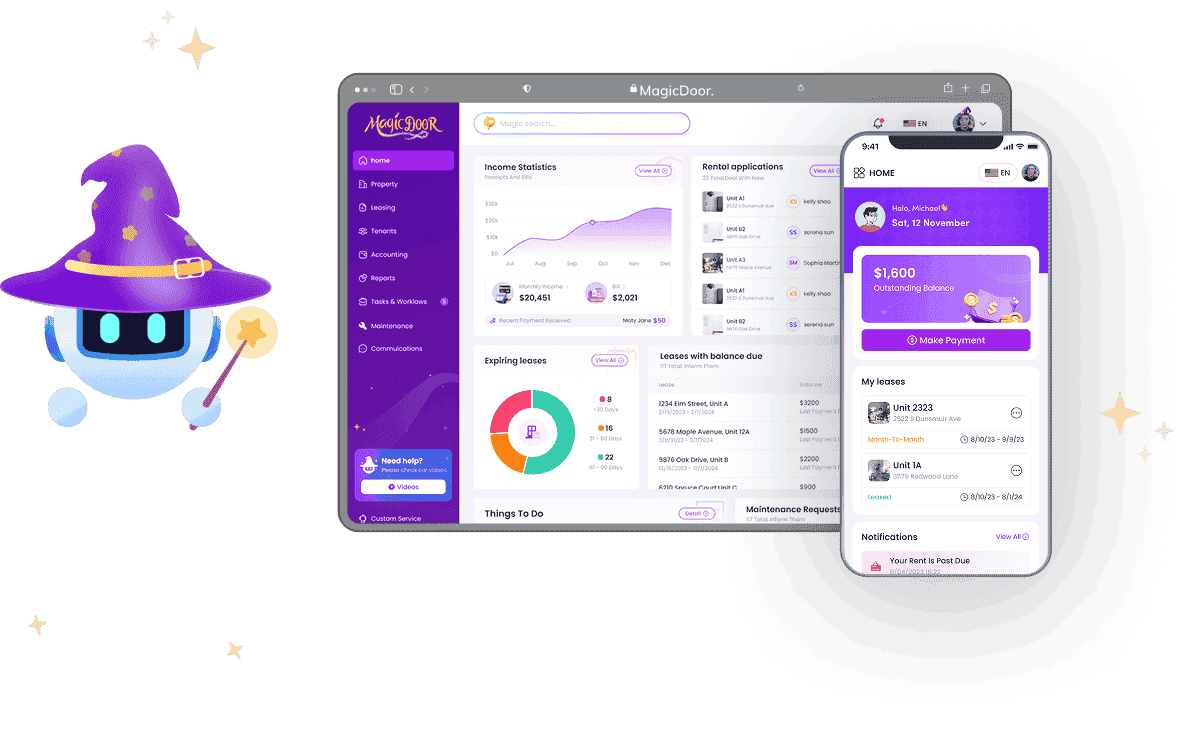Managing tenants is the key to rental success.
Rent price and property upgrades help, but don’t prevent late payments, complaints, or costly repairs. Tenant management does.
Landlords who:
- Communicate clearly
- Respond promptly
- Keep everything documented
…avoid disputes and protect rental income.
This guide brings together practical strategies for 2025. You’ll learn how to improve tenant relationships, handle maintenance issues efficiently, and apply systems that make your rental business less stressful and more profitable.
What is Tenant Management?
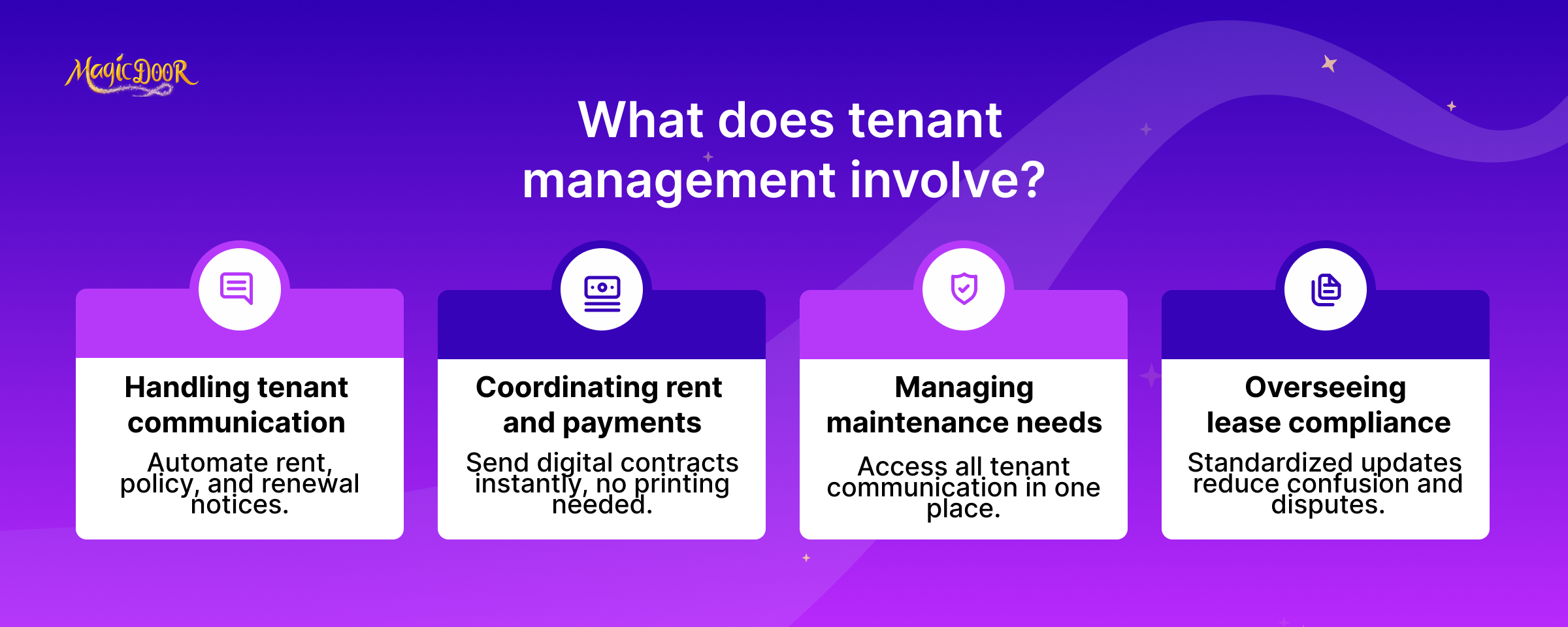
Tenant management is the process of overseeing tenant relationships, communication, and service across the entire lease lifecycle.
It starts when potential tenants apply for a rental unit and continues until a tenant moves out. During that time, landlords and property managers handle lease agreements, rent payments, security deposits, and tenant maintenance requests.
Why does it matter? Strong tenant management:
- Protects property owners legally under the state’s laws
- Improves tenant retention and reduces vacant units
- Keeps rental income and cash flow predictable
- Strengthens landlord-tenant relationships and reviews
Challenges appear when managing tenants without structure. Late rent, unresolved maintenance issues, and untracked complaints create frustration for both the landlord and the tenant. Even one rental property can become time-consuming without clear processes.
Many new landlords and real estate investors rely on property management software or a property management company to:
- Collect rent online with direct deposit
- Screen tenants using background checks and screening reports
- Submit maintenance requests and manage repairs
- Export accounting records during tax season
Done well, tenant management means fewer disputes, less tenant turnover, and more reliable rental income.
Top 9 Tenant Management Tips for Landlords
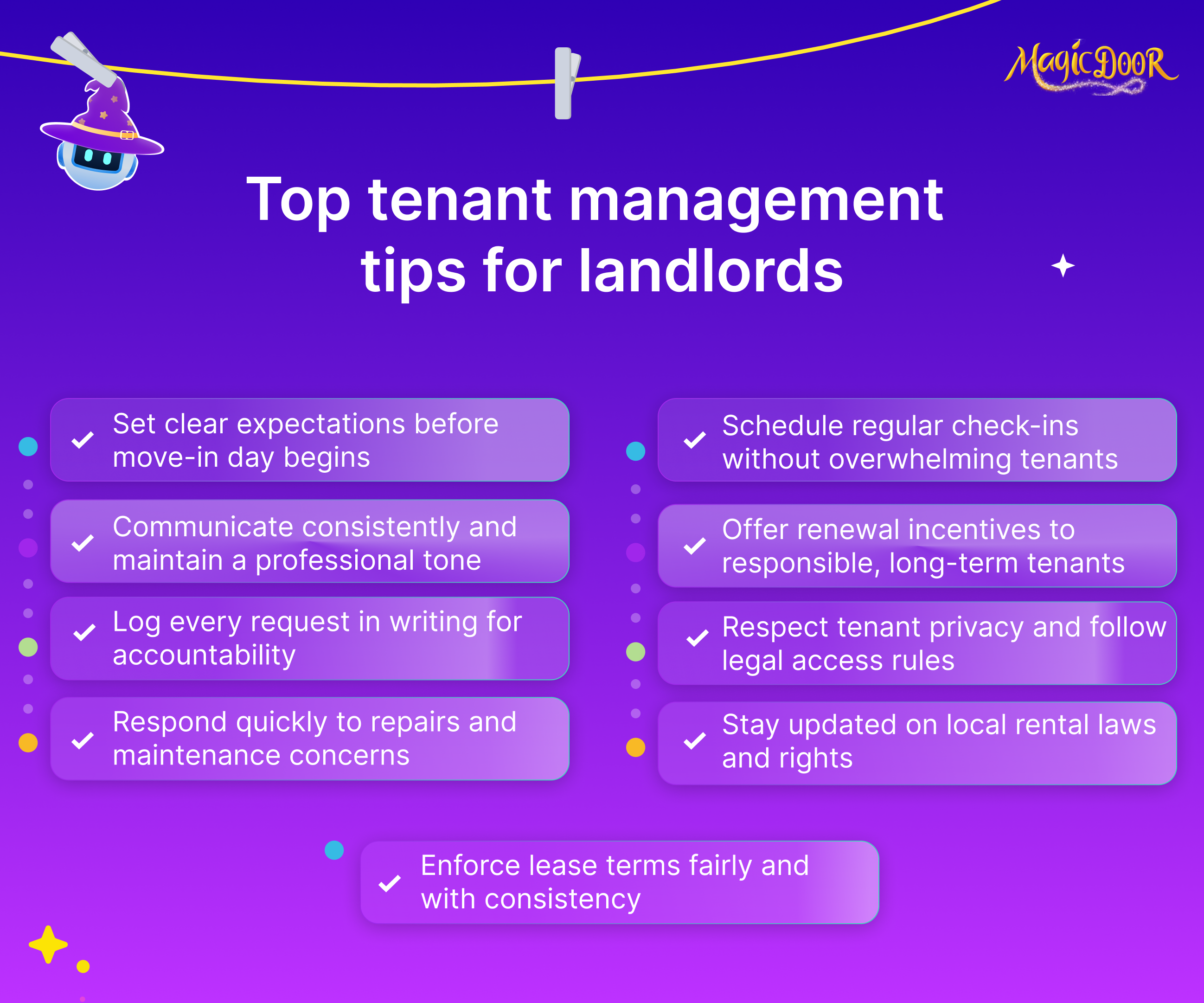
Set Clear Expectations Before Move-In
Tenant management starts long before the first rent payment.
From day one, new tenants should understand the lease terms, how rent is paid, and what happens with security deposits. Clarity up front prevents disputes later.
Key details to confirm:
- Due dates for rent and accepted payment methods (collect rent online, direct deposit, or other options)
- Rules for maintenance issues, from how to submit repair requests to response times
- Policies on renters insurance, other fees, and rent increases
- Notice periods for tenant moves or regular inspections
A good landlord explains these in writing, reinforces them with tenant communication, and avoids gray areas that frustrate tenants and property owners.
Communicate Consistently & Professionally
Tenant communication is at the core of managing a rental property.
Most tenants want quick answers about repairs, lease questions, or payments. Property managers who respond consistently build stronger relationships and reduce turnover.
Ways to keep communication effective:
- Use property management software or email to document phone calls and agreements
- Respond to maintenance issues promptly and confirm repair timelines
- Share updates about property rules or upcoming inspections
- Keep a professional tone, even when rent is late or disputes come up
When communication is clear and consistent, tenant relationships stay positive, and the rental business runs more smoothly for landlords and investment property owners.
Log Everything in Writing, Even Informal Requests
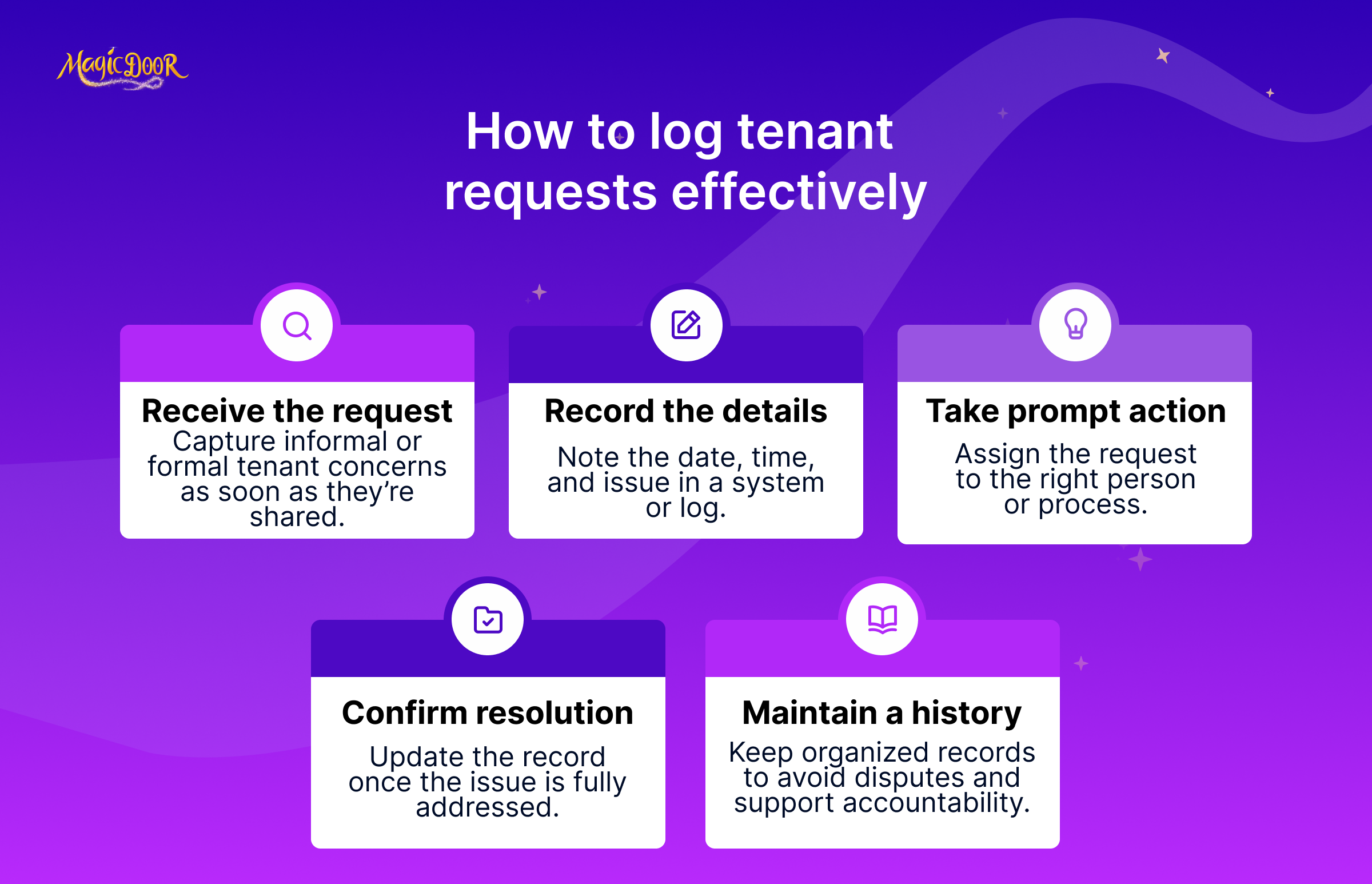
Phone calls and quick chats feel convenient, but if nothing is written down, details get lost.
Property managers and landlords who keep records avoid disputes about repairs, payments, or lease terms.
What’s worth documenting?
- Agreements about rent late fees, or partial payments
- Tenant questions about security deposits or lease renewals
- Promises made about when you’ll handle repairs
- Any complaints or requests that could resurface later
Even first-time landlords can protect their rental business by keeping a simple log in email or property management software. A paper trail turns “he said, she said” into clear proof.
Respond Quickly to Maintenance & Repair Issues
Few things frustrate tenants more than waiting weeks for a repair. A broken heater in winter or a leaking pipe in a rental unit can cost more to fix the longer it’s ignored.
For property owners, slow responses also damage trust and tenant retention.
Quick action looks like this: schedule inspections when issues are reported, confirm repair dates with tenants, and follow up after the work is finished. Property managers who use online systems to manage requests can handle repairs faster and keep a good relationship with tenants.
Delays hurt satisfaction and increase costs. A small leak today can become a water-damaged floor tomorrow.
Enforce Lease Terms Fairly & Firmly
A lease agreement is the backbone of managing a rental property.
It outlines rent due dates, maintenance responsibilities, and what happens if tenants pay rent late. Problems begin when rules are ignored or applied inconsistently.
How landlords can stay consistent:
- Apply late fees the same way for all tenants
- Follow state laws on how much notice is required before inspections or rent increases
- Keep written records of security deposits, renewals, and any policy changes
- Use property management software to track violations and communication
Being firm doesn’t mean being harsh. Property managers and landlords who enforce lease terms fairly maintain credibility and protect both the rental unit and the rental business.
Schedule Regular Check-Ins Without Being Overbearing
Tenants expect privacy but also appreciate knowing their landlord cares about the property.
Regular inspections help catch small maintenance issues before they turn into costly repairs, and they give renters a chance to raise concerns.
The key is balance. Too many visits feel intrusive, while no visits at all leave problems unnoticed. A good landlord sets clear expectations in the lease about how often inspections will take place and gives proper notice every time.
Short, respectful check-ins show professionalism.
They protect the property, keep communication open, and help build a good relationship with tenants, without making them feel like they’re under constant watch.
Offer Renewal Incentives for Responsible Tenants
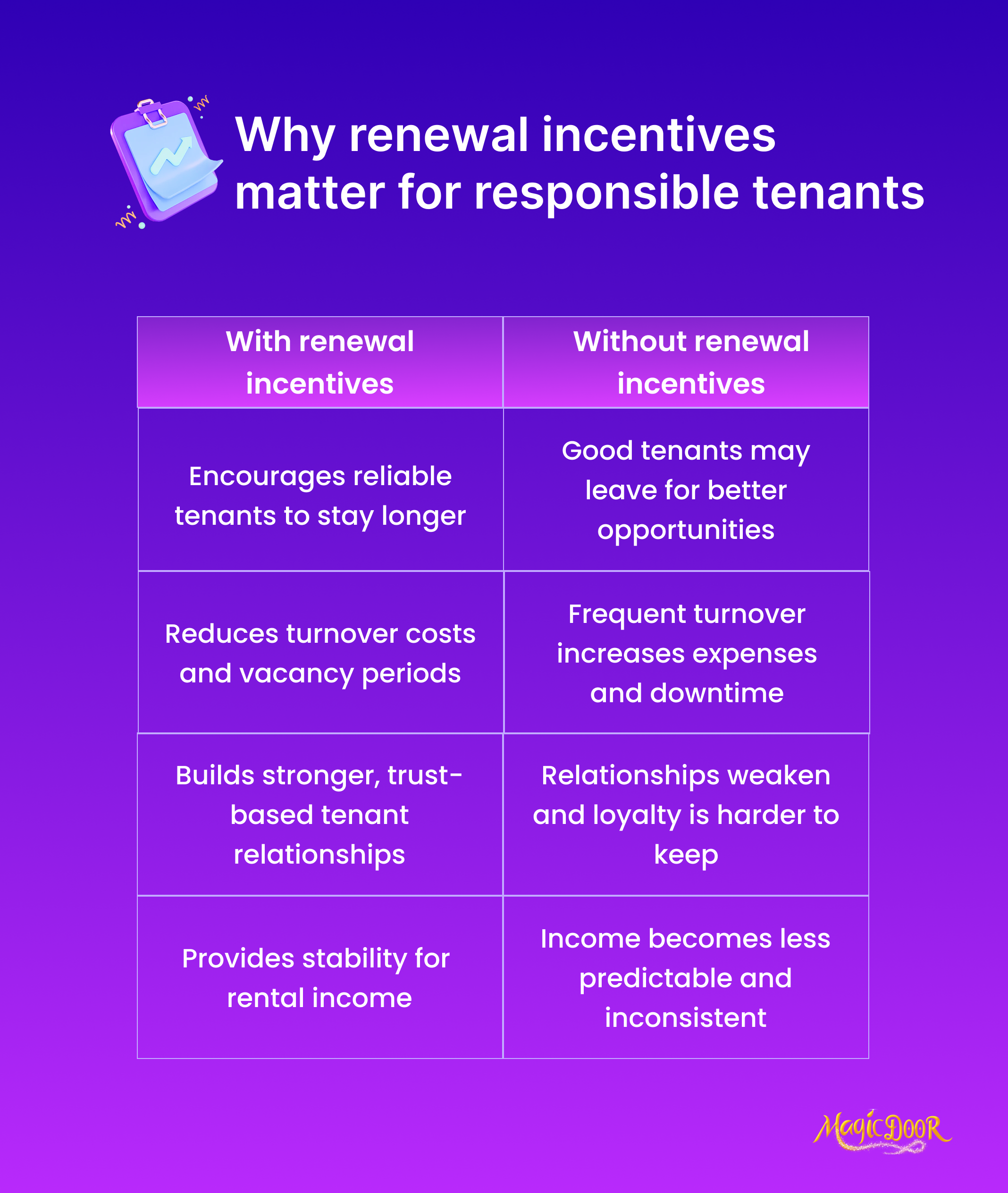
Keeping good tenants is far cheaper than finding new ones.
Each time a rental unit turns over, property owners lose rental income, spend on marketing to potential tenants, and risk longer vacancies.
Ways to encourage renewals:
- Small rent discounts for tenants who sign early
- Upgrades like new appliances or fresh paint
- Flexible lease terms for tenants with a stable rental history
Responsible tenants who pay rent on time, follow lease rules, and take care of the property deserve incentives. A simple reward helps reduce tenant turnover and keeps the rental business steady.
Respect Tenant Privacy & Legal Access Rules
Every lease spells out landlord rights, but tenants also have legal protections. Entering a rental unit without notice, even for routine maintenance, can weaken landlord-tenant relationships and, in many states, break the law.
A good landlord always:
- Provides the exact notice period required by the state’s laws
- Communicates the reason for entry clearly, whether it’s repairs or inspections
- Keeps visits short and professional
Respecting privacy builds trust.
Tenants feel secure, and property owners avoid disputes that can lead to complaints, legal action, or unnecessary turnover.
Stay Informed About Local Rental Laws & Tenant Rights
Rental laws differ from state to state, and missing a rule can be costly.
A landlord who ignores notice requirements, mishandles security deposits, or applies rent increases incorrectly risks fines and legal disputes.
Practical ways to stay compliant:
- Review your state’s landlord-tenant laws regularly
- Track updates on eviction procedures, notice periods, and rent control rules
- Consult a property management company or legal advisor for complex cases
- Keep written policies that align with tenant rights and fair housing standards
For property owners managing even one rental property, knowledge is protection.
Staying informed helps avoid lawsuits, keeps tenant communication professional, and ensures the rental business runs within the law.
How to Handle Difficult Tenant Situations
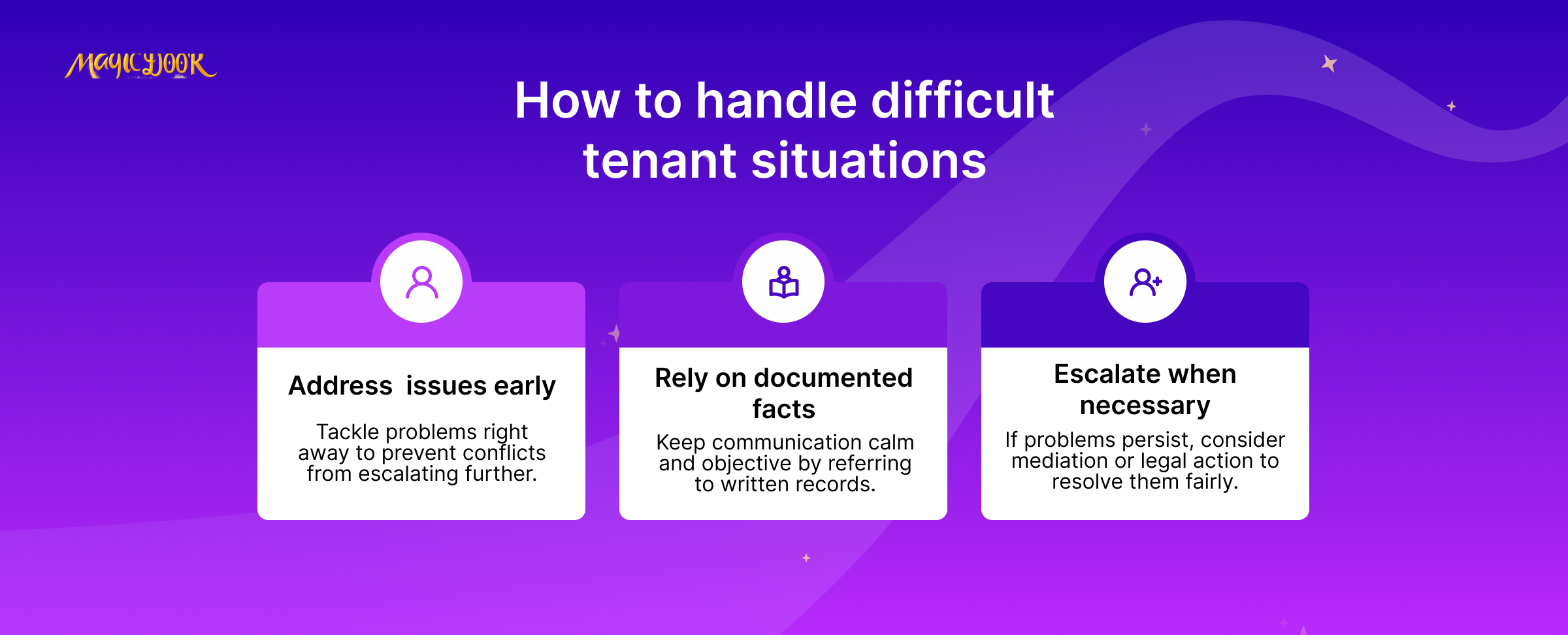
Address Problems Early Before They Escalate
Tenants rarely start as “difficult.” Problems usually begin small, late rent, constant noise, or skipped trash days. Left alone, those small issues pile up and turn into major conflicts.
A landlord who addresses concerns early shows consistency.
It could mean sending a written reminder after the first missed rent payment, or setting up a quick walk-through when repeated maintenance complaints come in. These moments don’t have to feel confrontational.
They’re guardrails that keep the rental property and the landlord-tenant relationship on track.
Stay Calm & Stick to Documented Facts
Arguments rarely solve disputes.
A landlord shouting about rent late fees won’t make tenants pay faster. What does help is leaning on documentation: the lease agreement, receipts for repairs, and records of communication.
Instead of saying “You never told me about this repair,” you can point to the maintenance request submitted two weeks ago. Instead of debating rent increases, you can show the signed lease that outlines the schedule.
Tenants may disagree, but facts create clarity, and clarity lowers tension.
Know When to Escalate to Legal Action or Mediation
Some situations spiral despite your best efforts. A tenant who refuses to pay rent or ignores property damage may leave you with no choice but to escalate.
This doesn’t mean jumping straight to eviction; it means knowing the steps.
- Mediation can solve issues without burning bridges.
- A property management company or attorney can explain the limits of the state’s laws.
- Eviction is the last option, requiring careful paperwork to avoid mistakes.
Landlords who recognize the right moment to seek outside help protect their rental business. Acting too late drains rental income; acting too early risks losing a good tenant who just needed a fair resolution.
How Good Tenant Management Improves Rental Performance
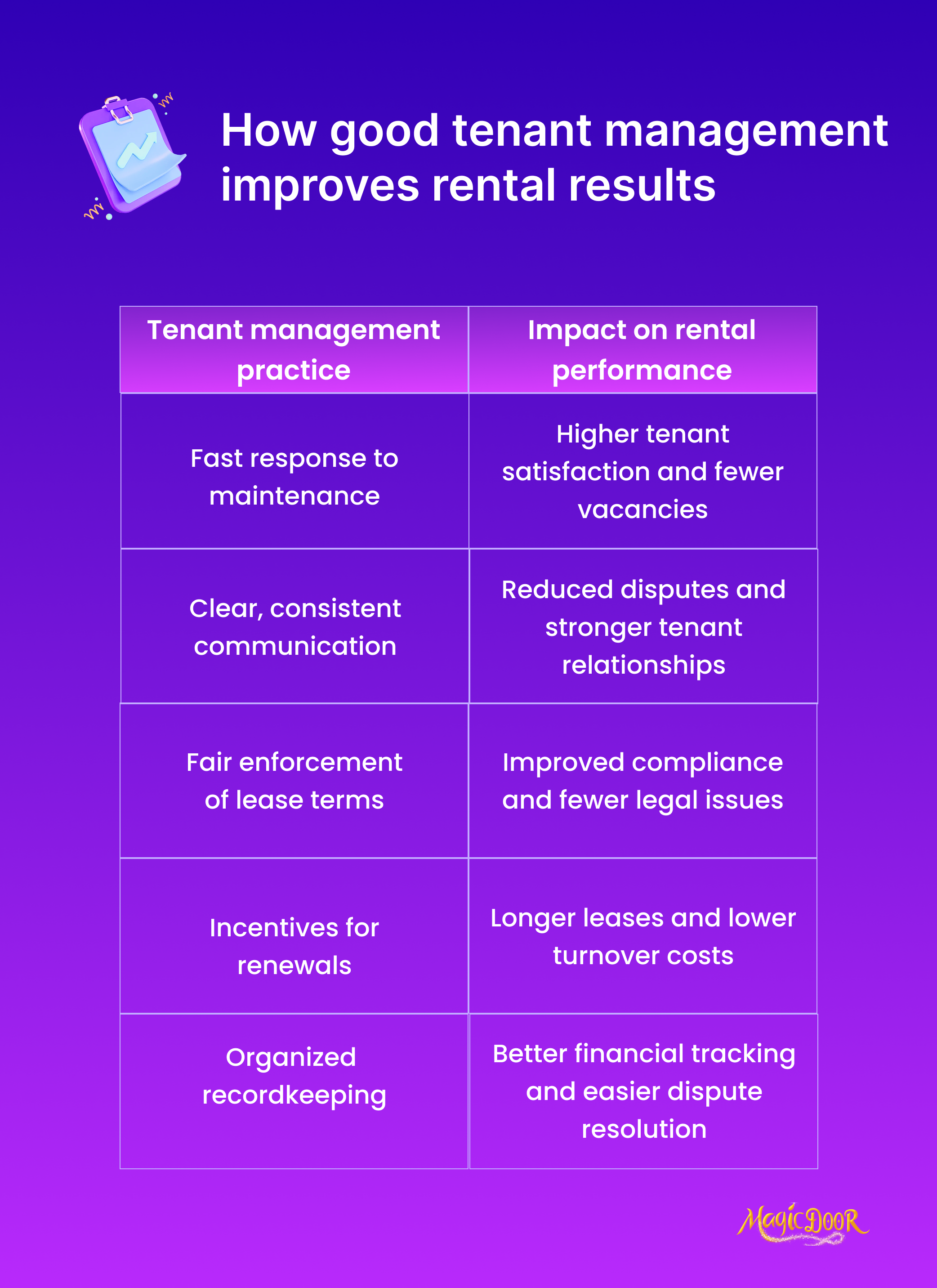
Tenant management directly influences the performance of a rental property.
Landlords who focus on tenant communication, resolve maintenance requests quickly, and enforce lease agreements consistently see stronger results across their rental business.
Effective management leads to:
- Lower turnover: tenants renew leases when they feel respected and supported
- Steady cash flow: reliable rent payments give property owners financial stability
- Reduced repair costs: proactive inspections and timely fixes prevent property damage
- Better reviews: satisfied tenants strengthen your reputation and attract potential tenants
For property managers and landlords, this translates into healthier financial outcomes. A rental unit with stable tenants generates consistent rental income, fewer vacancies, and lower operating expenses.
Scaled across multiple units, real estate investors gain more predictable returns and long-term growth.
Good tenant management builds a structure where problems are handled quickly, protecting property owners and tenants while keeping rental performance strong.
What is Tenant Management Software?
Tenant management software is a digital platform that allows landlords and property managers to handle rent payments, tenant communication, lease agreements, and maintenance requests in one system. It replaces manual processes like spreadsheets, paper files, and scattered phone calls with a single, organized workflow.
Key functions include:
- Rent collection: tenants can pay rent online through direct deposit, and landlords can apply late fees or track partial payments automatically
- Tenant communication: messages, reminders, and lease updates are stored in one record, reducing missed details
- Maintenance tracking: tenants submit maintenance requests digitally, and landlords can assign vendors or schedule repairs with clear timelines
- Financial management: expense tracking, accounting tools, and tax-ready reports help property owners prepare for tax season
Both individual landlords managing one rental property and property management companies overseeing large portfolios gain efficiency from this software.
Use MagicDoor to Improve Tenant Management
MagicDoor gives landlords and property managers a simpler way to manage tenants without monthly subscription fees. The platform brings together rent collection, tenant communication, and maintenance tracking in one system designed for ease of use.
Here’s how it helps rental property owners:
- Collect rent online: tenants pay rent through direct deposit, while landlords track partial payments, late fees, and rent history automatically
- Centralize communication: tenant messages, lease reminders, and updates are logged in one place, reducing missed calls or lost emails
- Manage maintenance requests: tenants can submit repair requests digitally, and property owners can schedule or assign work while keeping a record of costs
- Simplify financial reporting: expense tracking and export-ready reports make tax season less stressful for both DIY landlords and real estate investors.
For a landlord managing a single rental unit or a property management company managing multiple properties, MagicDoor makes tenant management more reliable.
Conclusion
Tenant management isn’t only about keeping tenants happy and protecting your investment. Done right, it lowers risk, boosts retention, and keeps your rental business efficient.
Think about what matters most:
- Enforce leases fairly
- Track tenant communication
- Handle repairs before they grow costly
Landlords who stay consistent build stronger relationships and maintain steady rental income.
And with tools like MagicDoor, you can collect rent online, manage maintenance, and export reports, without subscription fees. That leaves more time to focus on growth, not paperwork.

